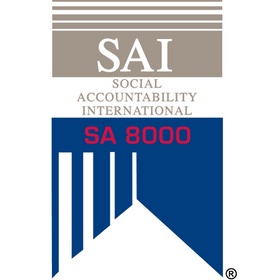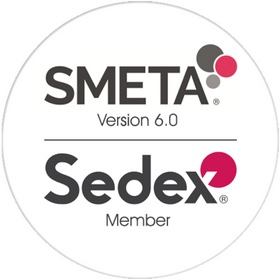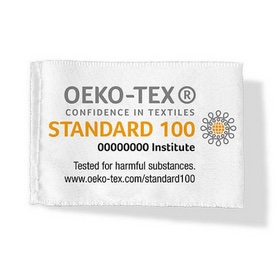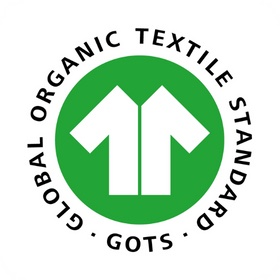
∼ The SA8000:2014 certification ∼
In 1997, the SA (Social Accountability) 8000 standard was created by the Council On Economic Priorities, an American NGO that has now become Social Accountability International (SAI) whose mission is to promote human rights at work.
The current certification conditions were last reviewed in 2014, which is why the certification is now called SA8000:2014.
The SA8000:2014 certification is based on the Universal Declaration of Human Rights and the conventions of the International Labor Organization (ILO).
It ensures, through serious, rigorous and regular audits that these rules and national labor laws are respected within the certified company.
The SA8000 certification is valid for three years, subject to the results of continuous surveillance audits, and the company can apply for a new SA8000 certification at the end of the third year.
The SA8000® standard is today the leading social certification standard for factories and organizations around the world.
The certification is issued on the basis of nine criteria:
- Child Labor: the company shall not engage in or support the use of child labour, except of course for young workers in training (internship, apprenticeship, etc…) ;
- Forced or Compulsory Labor: the company shall not engage in or support the use of forced or compulsory labour, including prison labour;
- Health and Safety: the company shall provide a safe and healthy workplace environment and shall take effective steps to prevent potential health and safety incidents and occupational injury or illness;
- Freedom of Association and Right to Collective Bargaining: all personnel shall have the right to form, join and organise trade union(s) of their choice and to bargain collectively on their behalf with the organization;
- Discrimination: the company shall not engage in or support discrimination in hiring, remuneration, access to training, promotion, termination or retirement based on race, national or territorial or social origin, caste, birth, religion, disability, gender, sexual orientation, family responsibilities, marital status, union membership, political opinions, age or any other condition that could give rise to discrimination;
- Disciplinary Practices: the company shall treat all personnel with dignity and respect. It shall not engage in or tolerate the use of corporal punishment, mental or physical coercion or verbal abuse of personnel. No harsh or inhumane treatment is allowed;
- Working Hours: the company shall comply with applicable laws, collective bargaining agreements (where applicable) and industry standards on working hours, breaks and public holidays. The normal work week, not including overtime, shall be defined by law but shall not exceed 48 hours;
- Remuneration: the company shall respect the right of personnel to a living wage and ensure that wages for a normal work week, not including overtime, shall always meet at least legal or industry minimum standards, or collective bargaining agreements. Wages shall be sufficient to meet the basic needs of personnel;
- Management System: company management should have a written policy to inform its staff, in all appropriate languages, that they have chosen to comply with SA8000. It must diffuse and communicate on all the procedures likely to implement the SA8000 standard. This last requirement allows employees to fully understand their rights and to assert them.
∼ The SEDEX SMETA audit ∼
SMETA (Sedex Members Ethical Trade Audit) is the most widely used social audit in the world.
SMETA is Sedex’s social auditing methodology, enabling businesses to assess their sites and suppliers to understand working conditions in their supply chain.
The sites are evaluated according to their organisation’s standards of labour, health and safety, environment and business ethics.
The SMETA methodology uses the ETI code (Ethical Trading Initiative) and local legislation as a measurement tool.
The ETI Code of Ethics is based on the conventions of the International Labor Organization and is a global benchmark that can also be used as a benchmark for developing fair trade action plans and for achieving social audits.
SMETA includes four modules:
- Health and security;
- Labour Standards;
- And eventually environment and business ethics.
Only audit companies (and their auditors) that meet a set of criteria set out by Sedex can conduct SMETA. These are known as a Sedex Affiliate Audit Company and are independent organisations from Sedex.


∼ Le label OEKO-TEX® STANDARD 100 ∼
STANDARD 100 by OEKO-TEX® is one of the world's best-known labels.
It certifies that every component of an article, i.e. every thread, button and other accessories, has been tested for harmful substances and that the article therefore is harmless for human health.
The test is conducted by independent OEKO-TEX® partner institutes on the basis of an extensive OEKO-TEX® criteria catalog.
The criteria catalog is updated at least once a year and expanded with new scientific knowledge or statutory requirements.
In many cases the limit values for the STANDARD 100 go beyond national and international requirements.
∼ La certification GOTS ∼
GOTS was founded by four well-reputed organizations: Organic Trade Association (OTA, USA), Internationaler Verband der Naturtextilwirtschaft (IVN, Germany), The Soil Association (UK) and Japan Organic Cotton Association (JOCA, Japan).
IVN and JOCA are textile industry organizations, while OTA and Soil Association are organic organizations rooted in organic agriculture and food.
Today, GOTS is recognized as the world's leading processing standard for textiles made from organic fibers.
It defines high-level environmental criteria along the entire organic textiles supply chain and covers the processing, manufacturing, packaging, labelling, trading and distribution of all textiles made from at least 70% certified organic natural fibers.
All chemical inputs such as dyes and auxiliaries used must meet very high environmental and toxicological criteria.
The main environmental criteria used for certification are as follows :
- Separation from conventional fiber products and identification of organic fiber products;
- Use of GOTS approved colorants and auxiliaries in wet-processing only;
- Processing units must demonstrate environment management, including wastewater treatment;
- Technical quality parameters for color fastness and shrinkage for finished goods required;
- Restrictions on accessories;
- Restrictions on additional fiber materials;
- Environmentally hazardous substances prohibited in chemical inputs;
- Evaluation of toxicity and biodegradability for chemical inputs.
The Standard also sets requirements concerning working and social conditions that are equivalent to those of leading social sustainability standards.
The GOTS quality assurance system is based on on-site inspection and certification of the entire textile supply chain (processing and trade).

.jpg)
.jpg)